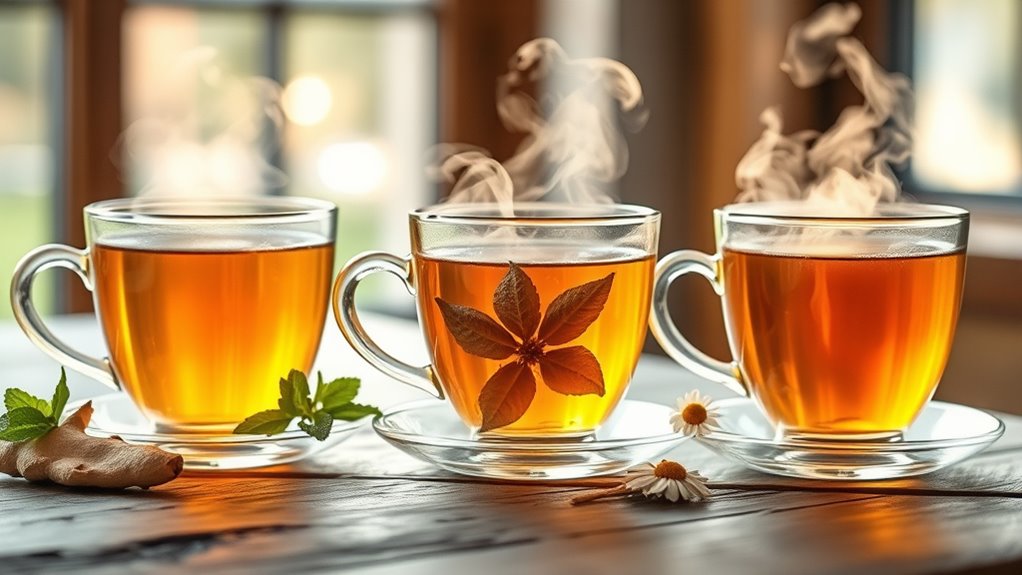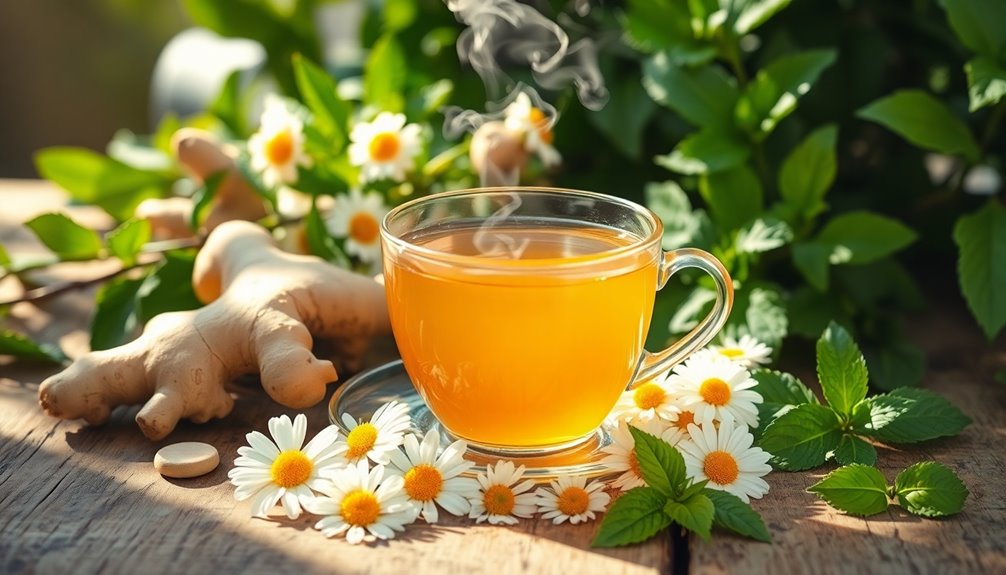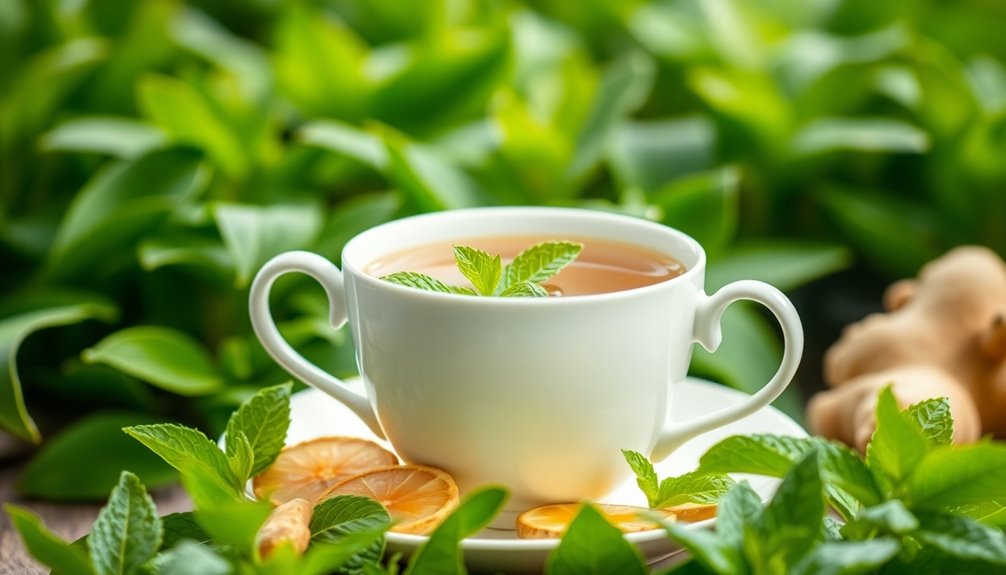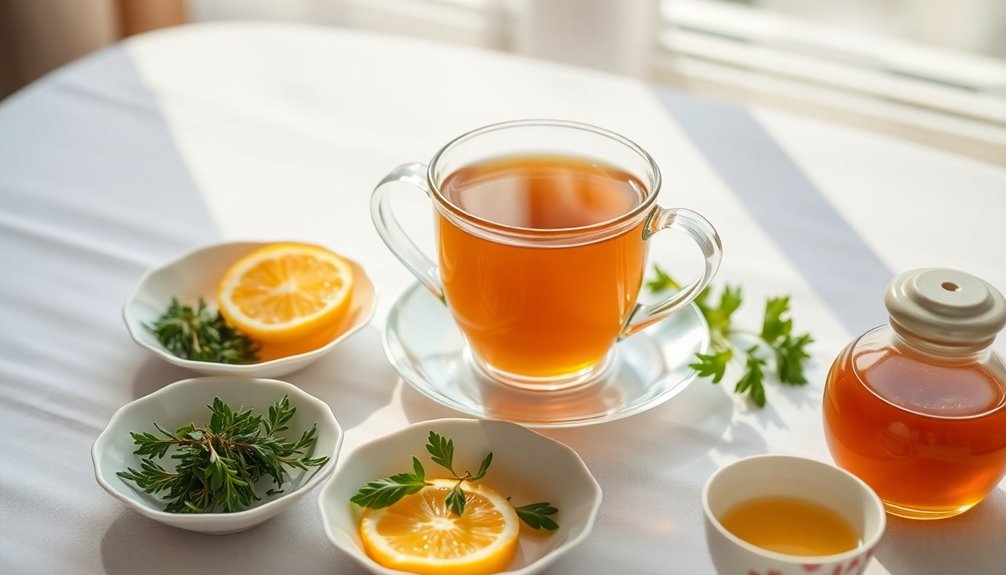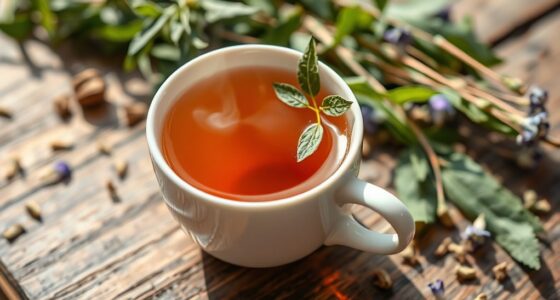To support your digestion naturally, try herbal teas like chamomile, peppermint, ginger, and fennel, which soothe inflammation and reduce bloating. Fermentation in teas helps boost your gut bacteria and improve nutrient absorption, making them even more beneficial. Regular consumption can strengthen your digestive health and ease common issues like gas and discomfort. Keep exploring to discover more about how these teas can become a calming addition to your daily routine.
Key Takeaways
- Herbal blends with chamomile, peppermint, ginger, and fennel soothe inflammation and reduce bloating.
- Fermentation-enhanced teas support healthy gut bacteria and probiotic growth.
- Fermentation increases nutrient bioavailability, offering more antioxidants and vitamins per cup.
- Incorporate fermented herbal teas as warm or cold infusions to improve digestion regularly.
- Combining soothing and fermented properties, these teas naturally aid in managing gas and promoting gut health.
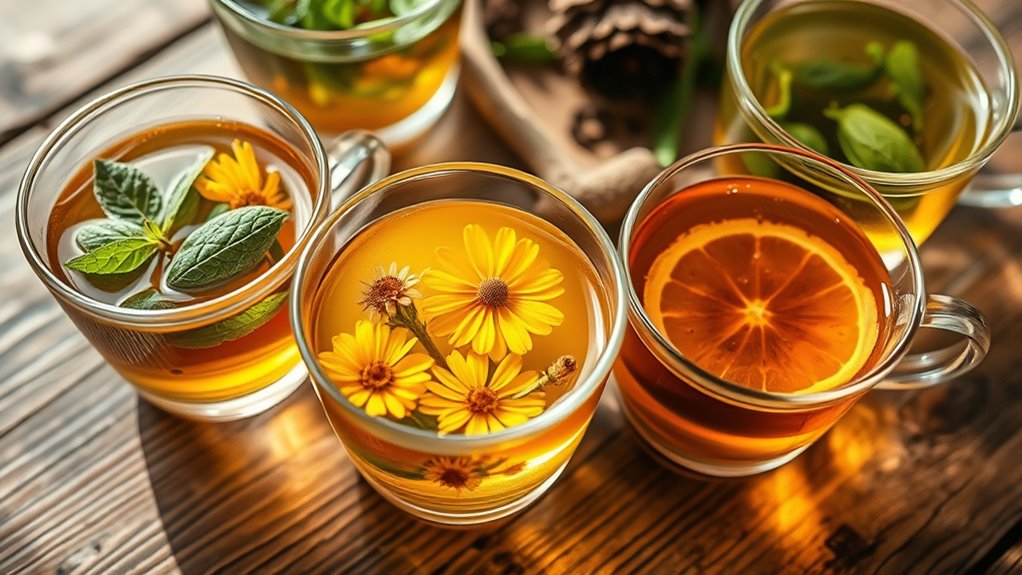
If you’re looking for natural ways to soothe your stomach and improve digestion, certain teas can be incredibly effective. Among these, herbal blends stand out because they combine various plants known for their soothing and healing properties. These blends often include ingredients like chamomile, peppermint, ginger, and fennel, which work together to calm inflammation, reduce bloating, and promote smooth digestion. Drinking these teas regularly can help you manage common digestive issues such as indigestion, gas, and stomach discomfort. Their gentle yet potent effects make them a popular choice for those seeking a natural remedy without relying on medications.
Many herbal teas also offer fermentation benefits, which can enhance your digestive health. Fermentation is a process that introduces beneficial bacteria, or probiotics, into your gut. When you consume herbal teas that promote fermentation, you’re supporting the growth of healthy bacteria, which are essential for a balanced microbiome. A healthy microbiome aids in breaking down food efficiently, absorbing nutrients better, and preventing harmful bacteria from taking over. Some herbal blends are specifically designed to foster this fermentation process, making them a double-edged sword for gut health—calming inflammation while boosting your microbiota. These teas can be especially beneficial if you’ve recently taken antibiotics or experience ongoing digestive discomfort.
Herbal teas that promote fermentation support healthy gut bacteria and improve digestion naturally.
In addition, herbal teas with fermentation benefits tend to have a mild, natural tang that can satisfy your palate while delivering health perks. The fermentation process can break down complex compounds in herbs, increasing their bioavailability and making their nutrients easier for your body to absorb. This means you’ll get more from each cup, whether it’s antioxidants, vitamins, or other beneficial compounds. Regularly drinking these teas can also help regulate bowel movements, reduce bloating, and support overall gut function. The key is choosing herbal blends that emphasize fermentation benefits, such as those containing ingredients like ginger, which is known for its pro-digestive properties, or fennel, which can relax your digestive tract.
Incorporating herbal blends that promote fermentation benefits into your routine is simple and enjoyable. You can brew them as a warm tea or even try cold infusions for a revitalizing twist. Over time, you may notice improved digestion, less discomfort, and a more balanced gut. These teas aren’t just soothing—they actively contribute to your digestive resilience and overall well-being. So next time you’re seeking a gentle, natural way to support your stomach, turn to herbal blends designed for fermentation benefits. They’re a tasty, effective way to nurture your digestion from the inside out.
Frequently Asked Questions
Can These Teas Help With Chronic Digestive Disorders?
Herbal teas can offer some relief for chronic digestive conditions, but their effectiveness varies. You might find that certain teas, like ginger or peppermint, soothe symptoms and help reduce inflammation. However, they shouldn’t replace medical treatment, especially for serious conditions. Always consult your healthcare provider to determine if herbal teas are appropriate for your situation. While they can support digestion, they are not a cure for chronic digestive issues.
Are There Any Side Effects From Herbal Teas?
Imagine you’re in a medieval apothecary—herbal teas can be beneficial but aren’t without risks. Herbal tea safety varies; some may cause potential allergic reactions or interact with medications. Always check ingredients and consult your healthcare provider if you have allergies or health conditions. While generally safe, consuming excessive amounts might lead to side effects like stomach upset or caffeine-related issues, so moderation is key.
How Much Tea Should I Drink Daily for Digestive Benefits?
You should aim for 2 to 3 cups of herbal tea daily to support digestion. Follow tea consumption guidelines that suggest ideal serving sizes to avoid overdoing it. Drinking moderate amounts helps you enjoy the benefits without risking potential side effects. Remember, consistency matters, so incorporate your chosen teas into your routine gradually and observe how your digestive system responds for the best results.
Are These Teas Safe for Pregnant or Breastfeeding Women?
Herbal tea safety varies, especially during pregnancy and breastfeeding. You should consult your healthcare provider before drinking any herbal teas, as some ingredients may not be suitable. Pregnancy herbal considerations are vital, since certain herbs can affect your baby or interfere with medications. Always choose teas labeled safe for pregnancy and breastfeeding, and avoid those with herbs known to cause contractions or other issues, ensuring you protect both your health and your baby’s.
Do Teas Interact With Common Digestive Medications?
Think of herbal teas as friends who sometimes clash with your meds. You should be cautious because herbal tea safety isn’t always guaranteed—some can interfere with common digestive medications through interactions. For example, senna tea might enhance laxative effects, causing issues. Always check with your healthcare provider about medication interactions before adding herbal teas to your routine, ensuring they’re safe for your unique health needs.
Conclusion
Incorporating these teas into your daily routine can turn your digestion from sluggish to spectacular. Whether you’re battling bloating or simply want to keep things running smoothly, these brews are your secret weapon. Trust me, once you experience the soothing magic of these teas, you’ll wonder how you ever survived without them. Think of them as tiny superheroes in a mug, ready to save your stomach—and your day—from chaos. Cheers to happier, healthier digestion!

